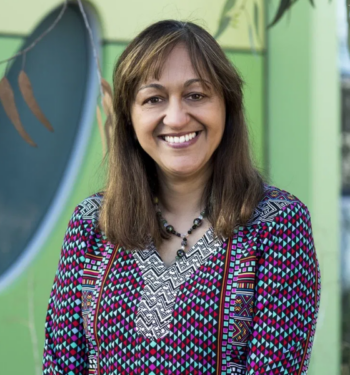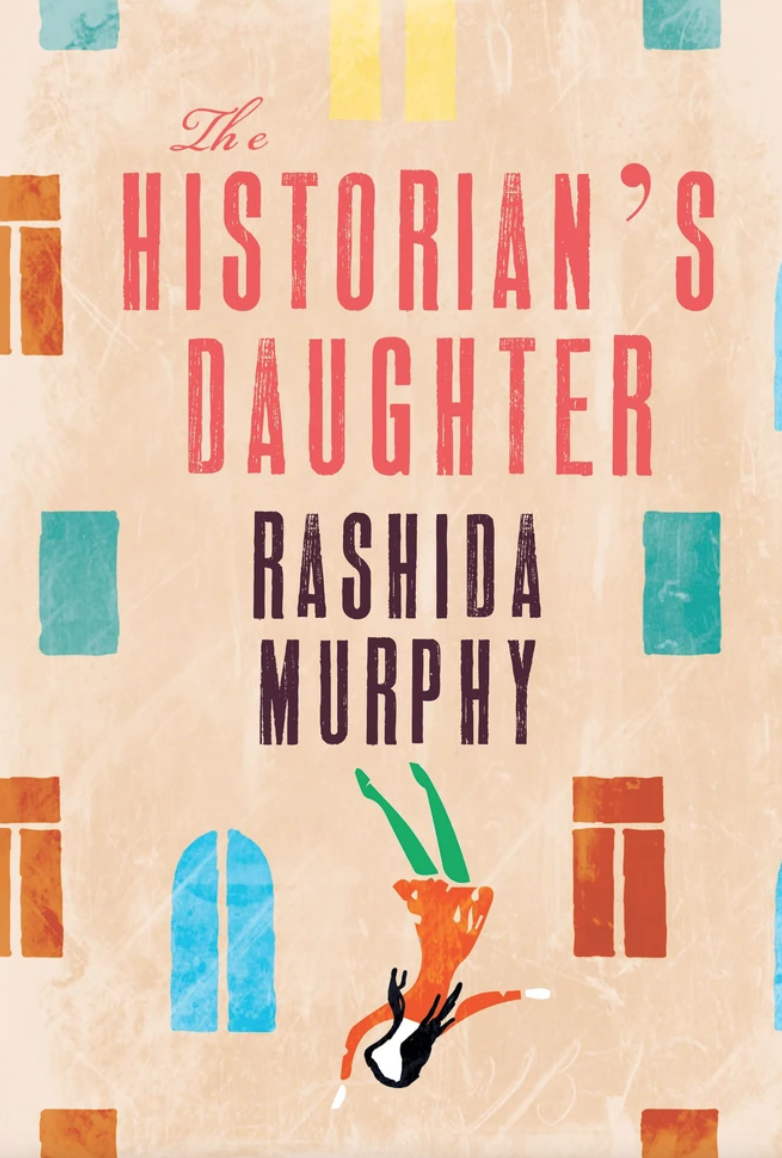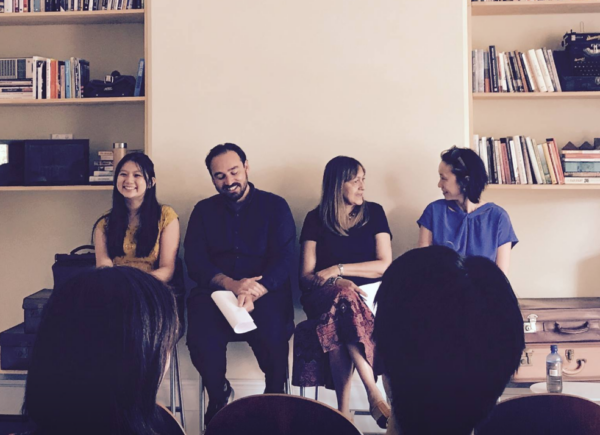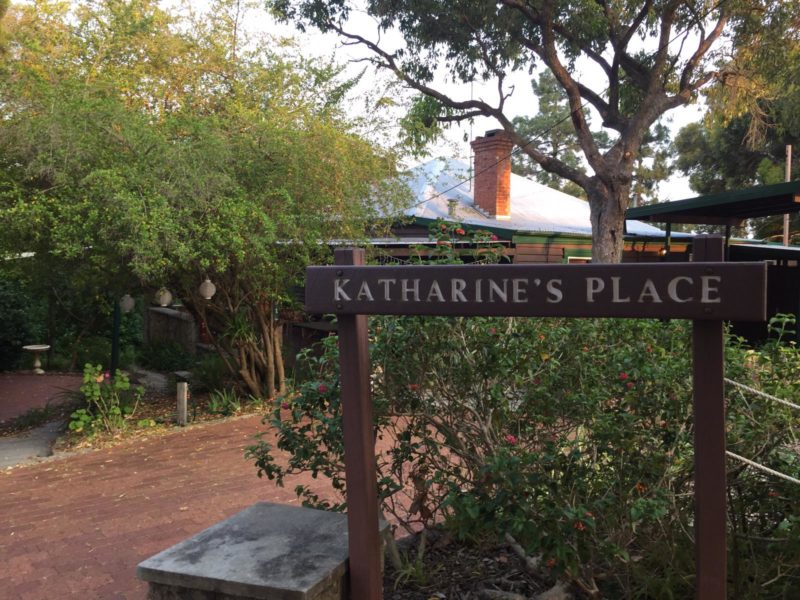
REPOST: Moving in from the Margins with Rashida Murphy
My best laid plans to publish a fresh interview before the new year has gone awry so here is a repost of my interview with Rashida Murphy from earlier this year.
***
Rashida Murphy is a Perth based writer, poet, mentor, and author of The Historian’s Daughter (2016, UWAP). She has a Masters in English Literature and a PhD in Creative Writing from Edith Cowan University. Rashida is also known in the local writing community for being a big supporter of emerging writers, especially those of us who are—for lack of a better term— ‘people of colour’, ‘ethnic writers’, ‘non-whites’, ‘third world looking’, ‘multicultural Australians’ [insert a term of your choice].
I was the beneficiary of KSP’s inaugural CALD Fellowship last year, a position that was generously sponsored by Rashida. After my stay at KSP, I approached Rashida for an interview because I want to highlight the challenges and complexities of being a writer with either a self-claimed or imposed ‘non-white’ identity. I have to say that had I not spoken with Rashida about where ‘ethnics’ like us are positioned within the local and national writing community, I probably would not have thought to submit my manuscript to Fremantle Press. For whatever reason, even though I was in their Emerging Writers pilot program, I was looking over east or overseas for a publisher. However, after my chats with Rashida about identity, place, and belonging in multicultural Australia, I realised how much I temper my writing voice when I am home. I also realised that it’s possible that if I didn’t grow up ‘other’ in Western Australia, my writing would perhaps have a different focus. Perhaps I would be writing Tudor/Stuart fiction, or perhaps I wouldn’t have the compulsion to write at all.
But enough about me, this is Rashida Murphy …
ES: First of all, I want to say thank you for sponsoring the CALD Fellowship at KSP, the only fully funded position at the centre. What inspired you to establish this program?
RM: Simply put, in the spirit of giving something back. I was KSP’s CALD writer-in-residence in 2017 and it was my first residency after I published my novel in 2016. I was grateful to the Centre for giving me space, time and a stipend to create new work and decided I would like to give back, both to KSP and to the CALD/WOC community specifically. I wanted to provide a small opportunity for Writers of Colour where they were, for a change, privileged over White writers because I do believe that it is not an equal playing field. Being a writer is hard enough, and being a writer of colour is just a tad harder.
I wanted to provide a small opportunity for Writers of Colour where they were, for a change, privileged over White writers because I do believe that it is not an equal playing field. Being a writer is hard enough, and being a writer of colour is just a tad harder.
ES: I find the term ‘CALD’ problematic even though I fall under that category because it is so vague and suggests that anything other than Federation age notions of what it means to be an Australia is ‘other’. In the old days it was NESB until they realised there were non-English migrants who spoke English. Alice Stephens said that n America, CALD is used in the education context. Henry Louis Gates Jnr. once said “Culture is one of those words we all know the meaning of until we probe further” and by David Yotsumoto as “the set of attitudes, values, beliefs, and behaviors shared by a group of people, but different for each individual, communicated from one generation to the next.’ Culture is such a contested term, so can you explain for people wanting to apply for the 2021 round, can what sort of person the CALD fellowship is looking for?
RM: I agree! I find the term CALD problematic, especially so since I found out that First Nations writers do not identify as CALD. And I also, deeply, want this Fellowship to be available to Aboriginal writers. To that end, it is now called the Diversity Matters Fellowship, and hopefully it will encourage First Nations writers to apply. My hope is that writers of colour become ‘mainstream’ and we won’t need to have labels for the things we aspire to do. But until then, I’d like to encourage writers, especially emerging ones, to make a week-long commitment to their writing. I like supporting my local writers centre, and I wish I could support another scholarship, but I can’t yet make that financial commitment, so I just sponsor one. Any writer who identifies as First Nations or a writer of colour can apply. We are looking for people already committed to their practice, with some work published or at least publishable, ready to commit a chunk of time that would benefit their work-in-progress. We get fabulous applications every year, and sadly can only offer one paid position but we also invite them to apply for the regular fellowship which is hugely subsidised anyway, if we think their work is strong.
ES: Many of us who are new to the writing scene think that ‘emerging writers’ are those in their 20s or early 30s, but as I have now discovered this is not the case. Can you share with us a bit about your journey to the publication of your debut novel?
RM: I’m categorised loosely as an emerging writer even though I’m definitely not in my twenties and thirties – along with ‘young’ emerging writers, so I think the terms are just a guideline. KSP guidelines state that emerging writers are those with 1 or 2 full-length publications, while established writers are those with more than 3 or 4. It varies – and it depends on who you speak to. Age has very little to do with it. Like you, I’ve been writing and publishing for a number of years. It just happened that my novel was published in 2016, but I had my first paid piece published in in 1996, and have had a fairly steady rate of publication throughout. My debut novel emerged out of a creative writing program, a PhD at ECU. My supervisors Ffion Murphy and Marcella Polain, who are established writers/editors as well as academics, guided me through the process, each offering their individual strengths as guides and readers. It was a long, sometimes harrowing, mostly tough process, but as Ffion said to me once; a PhD is the highest degree one can aspire to, it’s meant to be tough. I didn’t appreciate the truth of that then. I finished writing the novel in 2015, and entered it into the Dundee Award where it was shortlisted. Then I finished the rest of my PhD (exegesis), submitted it for examination, passed, and sent the novel to Terri-ann White at UWA Publishing, who accepted and published it in 2016.
It was a story I always wanted to write, a story about complicated immigrant families where races and religions don’t neatly harmonise, where relationships are compromised when there is cultural dissonance, where the very idea of ‘Australia’ is looked at through a prism.
 ES: What inspired you to write The Historian’s Daughter, and to write it within the context of a PhD?
ES: What inspired you to write The Historian’s Daughter, and to write it within the context of a PhD?
RM: It was a story I always wanted to write, a story about complicated immigrant families where races and religions don’t neatly harmonise, where relationships are compromised when there is cultural dissonance, where the very idea of ‘Australia’ is looked at through a prism. I thought it might offer a glimpse into the lives of characters who were not White Anglo-Saxon Australians. It went through several incarnations, points of view and overburdened storylines. I learned how to write a novel, and for me that was huge. I’m used to seeing my stories and poems emerge in a couple of days – the enormity of living with a story for five years almost drove me batty. Why a PhD? I wanted a challenge. And I wanted a scholarship. I got both. I wanted to treat it like a job because I understood the privilege of being afforded a wage in order to write. Other writers who’d completed their first novels as part of a PhD said it was worth doing, and that writers don’t usually get a wage for writing a novel. So I showed up at my desk every day for five years and persisted stubbornly in my attempt to do something big and tough. Before I committed to a PhD as a fulltime student, I’d been teaching at TAFE for 20 years and, frankly, had lost the will to live. My students were becoming more racist and my tolerance for negativity was becoming shorter. I worked with a fabulous and diverse group of women with whom I still keep in touch, but I had lost the passion I could see they still had for the job, the department, the students. It was time to go. If I’d stayed I would have become bitter and grumpy. I’m now naturally grumpy but not because my students make me so.
ES: We both migrated to Australia in the early 80s, I was a child, so I had absolutely no idea that we arrived 7 years after the end of the White Australian Policy. If I had been given some context – including the history of pre-colonisation, perhaps my early experiences here would have been less bewildering. As someone who arrived here as an adult, were you more aware of Australia’s history before you came here?
RM: Ah yes, we have that in common. I too knew nothing about the devastation that colonisation had wrought on the people and the landscape. I had a few romanticised versions of the story of outback Australia and the great southern land. I knew something about the White Australia Policy and how an attempt to separate Aboriginal families in order to ‘civilise’ or ‘Christianise’ had resulted in deep divisions and fractures in Aboriginal society. But I was unaware of too many things. I knew I had to read my adopted country in its own words. When I went looking I found Henry Lawson and Patrick White and Banjo Patterson. They taught me nothing and all I felt was a sense of distaste and uneasiness, that I was missing the big picture. Then, blissfully, I fell into Sally Morgan’s My Place and I was unstoppable after that. I read about colonisation, race relations, history not written by white people, first-hand accounts of the Stolen Generation. I already knew about the dangers of history written by the victors, naturally suspicious of accounts that glorified Captain Cook, because India was a former British colony and I had grown up reading accounts written by white historians. I knew I needed to find history and poetry and fiction that spoke the truth. I found fabulous writers like Bruce Pascoe, Kim Scott, Alexis Wright, Melissa Lucashenko, Ellen van Neerven, and Anita Heiss who continue to inform my education and In their words, find the soul of this country.
ES: What is your most treasured possession?
A book called Eats Shoots and Leaves by Lynne Truss given to me by my daughter on the day I got married, with a bookmark that reads – ‘all it needed was the right balance of love and friendship and a pair of comfy shoes.’ My daughter is a very perceptive human, and that description perfectly describes my relationship with my husband. The book also carries an inscription in her beautiful writing where she holds me responsible for her “anally retentive habit of always noticing bad grammar” and for her “tendency to create glorious and nonsensical words.” I guess my job as a mother is done.
ES: What is your greatest extravagance?
RM: I would say books because that’s what I spend the most money on, but they are not an extravagance. They are a necessity. I don’t think I’m extravagant, to be honest. I think I’m naturally frugal and mindful of the impact of buying and throwing out, so I try to be contained, except when it comes to books. I buy them, read them, stack them on shelves and in piles, almost never give them away, except when the writer annoys me or turns out to be misogynistic or racist. Then I throw them out because I couldn’t give them away to anyone I liked if I knew the writer was a terrible person. Sometimes, when I know I’ll never read a particular book again, I give it away. I have a couple that I’m happy to give you if you like.
ES: Yes Please!
RS: They’re both by the same author, non-fiction.

ES: What is next for Rashida Murphy the writer?
RM: I always write several things, just as I always read more than one book at a time. I’m currently writing short stories and poetry and essays and memoir, but I’m also finishing a novel. I have the first draft of my second novel that I’m in the process of editing, which will probably take the rest of the year. I’m enjoying the work I do at The Centre for Stories and am looking forward to the mentoring projects as well as a series of Masterclasses being run in July and August this year, that I’m proud to be part of. I have a couple of other interesting speaking and editing gigs to keep me busy for the rest of the year. And of course, the Perth Writers Festival, where I’ll be speaking with poet Caitlin Maling as well as in a session about my mentoring experience with Winnie Dunn and Claudia Mancini.
Thank you, Emily, I really enjoyed doing this. All the best with your upcoming poetry collection. I love your work, as you know, and I’m really looking forward to reading more of it.
Thank you so much for doing this interview!
Read an extract of The Historian’s Daughter here.
Find Rashida at Rashida Write Now http://rashidawritenow.com


